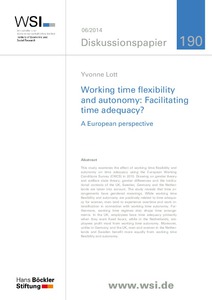Working time flexibility and autonomy: facilitating time adequacy?
"This study examines the effect of working time flexibility and autonomy on time adequacy using the European Working Conditions Survey (EWCS) in 2010. Drawing on gender theory and welfare state theory, gender differences and the institu-tional contexts of the UK, Sweden, Germany and the Nether-...
| Main Author: | |
|---|---|
| Institution: | ETUI-European Trade Union Institute |
| Format: | TEXT |
| Language: | English |
| Published: |
Düsseldorf
2014
HBS |
| Subjects: | |
| Online Access: | https://www.labourline.org/KENTIKA-19117410124919356929-Working-time-flexibility-and-a.htm |
| Summary: | "This study examines the effect of working time flexibility and autonomy on time adequacy using the European Working Conditions Survey (EWCS) in 2010. Drawing on gender theory and welfare state theory, gender differences and the institu-tional contexts of the UK, Sweden, Germany and the Nether-lands are taken into account. The study reveals that time ar-rangements have gendered meanings. While working time flexibility and autonomy are positively related to time adequa-cy for women, men tend to experience overtime and work in-tensification in connection with working time autonomy. Fur-thermore, working time regimes also shape time arrange-ments. In the UK, employees have time adequacy primarily when they work fixed hours, while in the Netherlands, em-ployees profit most from working time autonomy. Moreover, unlike in Germany and the UK, men and women in the Nether-lands and Sweden benefit more equally from working time flexibility and autonomy." |
|---|---|
| Physical Description: | 20 p. Digital |

